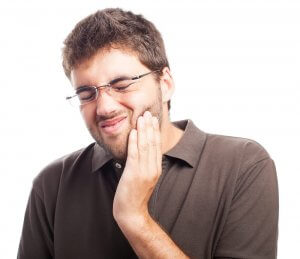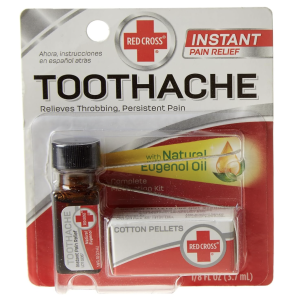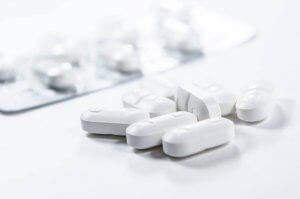Toothache is something that most of us will experience at some point in our lives, for one reason or another. There are many oral health factors that can cause tooth pain, but when it happens to you, all you really want to know is how you can get rid of a toothache fast.
In this article, we look at what causes different types of tooth pain, how to get rid of or relieve toothache if you're in pain right now, some toothache medicine, and what treatment you might need to stop it altogether.
We also have some tips for preventing tooth, jaw, and gum pain in the future.
In This Article
- 1 Is toothache an emergency?
- 2 What causes toothache?
- 3 Toothache pain from tooth infection or decay
- 4 Wisdom tooth pain
- 5 Broken/cracked tooth pain
- 6 Toothache after filling or other dental work
- 7 What to do for a toothache after getting dental implants
- 8 Throbbing tooth pain that comes and goes
- 9 Can Sinus Infection Cause Tooth Pain?
- 10 Toothache in pregnancy
- 11 My tooth hurts when I bite down or touch it
- 12 My tooth hurts at night but not during the day
- 13 Front tooth pain
- 14 How to get rid of toothache
- 15 How to stop a toothache and toothache relief: summary
- 16 Tooth pain FAQs
Is toothache an emergency?
If you're reading this article because you or someone you know has a toothache right now, check for other symptoms that are a sign of something more serious. You should go to urgent care or call the number we listed in the intro if you have either of the following toothache symptoms:
- Swelling around your eyes or neck
- Swelling in your mouth or throat that's making it difficult for you to talk, breathe or swallow
- Intense pain in your jawbone
- Gum infection with pain or swelling
- Bleeding that won't stop
- Broken or knocked-out tooth
- Tooth decay that causes pain
- Broken filling that causes pain
- Trauma involving facial bones, potentially compromising the patient’s airway
Read more about what constitutes a dental emergency.
For less severe toothache, you might still need to see a dentist but there are plenty of tooth pain and toothache relief options you can try in the meantime. More on those later, but first let's understand the various toothache causes that might be at the root of the problem.
What causes toothache?
There are a number of different toothache causes we're going to look at here. Dental pain is often the result of tooth decay, either directly or indirectly. You might also have sinus infection tooth pain, wisdom teeth problems, or tooth damage from an injury. Plus, it's common to experience toothache after a filling, extraction or other dental work.

Below you can read about the different causes of toothache and what you can do to help get rid of tooth pain in each case.
What causes dull tooth pain?
Dull tooth pain isn't always an indication that something is wrong, although it certainly can be. Some of the causes of dull tooth pain include:
- Food stuck between teeth
- Something stuck in your gums
- Bruxism, or tooth grinding
- Tooth decay and cavities
- Tooth abscess
Try brushing and flossing to dislodge any potential culprits, and monitor pain to see if it worsens or persists.
Toothache pain from tooth infection or decay
Teeth consist of three layers. The inner part, called pulp, contains the nerves and blood vessels. This is surrounded by a layer of dentin, and then the outer layer of strong, hard enamel, which protects everything within.
Failure to maintain good oral hygiene allows bacteria and dental plaque to build up on the tooth surface, leading to decay. Once decay erodes a hole in the enamel and reaches the dentin, the tissue becomes inflamed as your body fights the infection, resulting in painful or sensitive teeth. You might even notice your teeth appear translucent. Tooth decay will continue to spread unless treated, and if it reaches the nerves in the tooth pulp it can cause inflammation (pulpitis) and more severe toothache.
If you notice some discoloration on your tooth or you can feel a hole, these are signs you have tooth decay. You can read more about tooth decay symptoms, causes, and treatment.
Tooth abscess pain
Untreated decay can eventually lead to a gum or tooth abscess – a pocket of puss that forms because of bacterial infection. The video animation below shows how decay spreads to cause tooth pain and infection:
Abscesses can be extremely painful, usually causing throbbing tooth pain that comes and goes or remains constant.
If you have a dental abscess you might also experience:
- Swelling in your face or gums
- Increased tooth pain when the tooth is tapped or exposed to hot or cold
- Jaw pain
- Earache
- Headache
You'll find lots more information about this problem, along with abscessed tooth pain and toothache relief in our article on dental abscesses.
What to take for your toothache caused by decay
Does your tooth ache because of decay? If you think your toothache is caused by decay, you should make an appointment to see your dentist. If caught early, a simple filling is enough to remove the decay and restore the tooth. Once decay spreads further, it may require root canal treatment or a crown – or extraction if the tooth is very badly damaged – so it's worth getting to a dentist sooner rather than later.

While you await treatment, you can take painkillers or other toothache medicines to keep any pain under control.
If you have severe, throbbing tooth pain and you think you have an abscess, you may need to make an urgent appointment to receive emergency toothache relief and perhaps antibiotics. Regular painkillers might not be enough to soothe tooth infection pain.
Note that even if bad toothache pain subsides by itself, it's still a good idea to visit a dentist. You may still have a tooth infection that needs to be treated before it causes an abscess.
Wisdom tooth pain
Wisdom teeth, also known as third molars, are a source of back tooth pain for some people.
These teeth are located right at the back of your mouth and they sometimes don't have enough space, which causes them to become impacted. An impacted tooth can't erupt properly and instead pushes against the neighboring tooth. This in itself can cause toothache or gum pain, but it also increases the risk of infection.
Even if your wisdom teeth erupt naturally, you might experience some gum pain at the back of your mouth where the tooth is pushing through.
Read more about wisdom tooth pain and what you can do about it.
What to do about back tooth pain
Visit your dentist. If an impacted wisdom tooth is painful or infected, it might need to be extracted. Your dentist will take x-rays of your mouth to check the position of any problem teeth and will advise you of the best course of action. Whatever you do, don't pull your own tooth.
To soothe pain from an erupting tooth, use a topical oral anesthetic gel.
You can find out more about wisdom teeth here, including the problems they might cause and what treatment involves.
Broken/cracked tooth pain
Cracked or broken teeth can cause a lot of toothache, especially if the tooth nerves are exposed. Teeth can crack or break for a number of reasons, including:
- Damage from tooth decay
- Old fillings
- Biting down on something hard
- An injury to the face or mouth
If your teeth hurt from cracked teeth, you'll be able to see or feel a crack in your tooth, or feel a part of it come away.
How to soothe a toothache from a broken tooth
Painkillers might help with the pain but you can make an emergency dental appointment if you need stronger pain relief. It's important to get the tooth repaired or treated ASAP, even if the pain subsides. Avoid eating on that tooth in the meantime, since this will increase tooth nerve pain and may cause further damage. The deeper a crack goes, the less likely that the tooth can be rescued.
Keep any broken pieces of tooth, if you have them. This will help your dentist match any reconstructions to the original shape. Use chewing gum or orthodontic wax to cover any sharp bits of tooth in your mouth that might cut your tongue or gum. Read more advice on dealing with a cracked or broken tooth and tooth nerve pain relief.
Toothache after filling or other dental work

It's fairly common to feel some sensitivity or tooth pain after fillings, root canal treatment, or crown or bridge fitting. The dentist has altered the structure of your tooth, and once any anaesthetic has worn off it can still take some time for your mouth to recover and for any swelling to subside. It's not uncommon to experience tooth pain after filling while chewing, or when exposed to hot or cold, as your filled tooth will be more sensitive to pressure and temperatures.
Contact your dentist if:
- You're in severe pain following dental work
- You have throbbing tooth pain after filling a cavity
- The pain continues for several days
- The pain starts getting worse
- You have tooth pain weeks after filling a cavity
Otherwise, it should soon feel much better.
Pain after tooth extraction
One potential complication to be aware of is a condition called dry socket, which can occur after tooth extraction.
Following an extraction, a blood clot forms in the socket to protect the bone and nerves while the gum heals over. If the clot becomes dislodged before this healing is complete, the exposed nerves will be extremely painful. This is more likely to happen with molar extractions where the socket is larger.
If you experience strong throbbing pain after a tooth extraction, you might have dry socket. Contact your dentist straight away – they will clean and dress the wound and give you pain medication.
Read our article about having teeth removed to find out more about pain caused by extraction.
What to do for a toothache after getting dental implants
Another potential cause of toothache may be tooth implant pain. After an implant procedure, you may experience some discomfort and bruising. Read here for more information about dental implants.
Throbbing tooth pain that comes and goes
Intermittent, throbbing tooth pain, or a toothache that comes and goes may be due to unprotected tooth nerves, or nerves that have lost their protective enamel coating. These teeth can be sensitive to hot or gold sensations, or even the brushing of your teeth. As we mention throughout this article, nerve pain can be a result of:
- Cracked or broken teeth
- Gum disease
- Smoking
- Too hard brushing
- Bruxism
Can Sinus Infection Cause Tooth Pain?
Yes. Have you ever noticed that your teeth feel more sensitive when you have nasal congestion? If you get a toothache with cold symptoms, it's probably because your sinuses or nasal cavities are swollen, putting pressure on your upper jaw. Congested sinuses can also cause pain around your eyes or elsewhere in your head.
How to ease sinus tooth pain
Sinus toothache is usually dull rather than sharp, but it might get worse at night when you lie down. Using an extra pillow to lift your head higher should help ease the pressure. You can also use decongestant medicines to help clear your nose and sinuses.
How long does a sinus toothache last?
A toothache from a sinus infection will start to improve only once the inflammation of your sinus begins to be relieved. This can take anywhere from a couple of days to a couple of weeks.
Toothache in pregnancy
Pregnant women are at increased risk of tooth decay and gum disease because of changes to their hormones. To add to this, vomiting from morning sickness coats the teeth in acid which erodes enamel. This can cause overall tooth sensitivity, sudden tooth pain and front tooth pain in particular.
To minimize the chances of toothache during pregnancy, it's important to continue regular dental checkups and pay special attention to your oral hygiene during this time.
My tooth hurts when I bite down or touch it
Does your tooth hurt when you bite down on food? If your tooth hurts when biting down, it could be caused by decay, a loose filling or a crack in your tooth. Another potential cause of pain when biting down is damage to the pulp inside of your tooth. If this sensation continues, get to your dentist so you can talk about your treatment options.
My tooth hurts at night but not during the day
Any of these kinds of toothache can feel worse at night. Toothache at night happens because when you lie down, the blood pressure in your head increases and puts increased pressure on areas that are already inflamed and sensitive.
To help a toothache at night, try elevating your head with one or two extra pillows while you sleep. This is not a toothache cure but it should help relieve your discomfort while you seek appropriate treatment for the source of the pain.
Front tooth pain
We mentioned above that the vomiting resulting from morning sickness during pregnancy can erode enamel, causing tooth sensitivity, and sudden tooth pain, especially front tooth pain. But are there other reasons why you're experiencing front tooth pain?
Front tooth pain can be caused gum recession, cavities or thin enamel. Many people who experience pain in their front teeth notice it most when they bite down into something cold, like ice cream. This is because of sensitivity caused by thin enamel.
How to get rid of toothache

We can say that in almost every case, the best thing for a toothache is a trip to the dentist. Very few of the underlying causes of toothache can be cured at home, although you can take medicines to relieve the pain.
The toothache treatment you receive at the dentist will depend on what's causing the pain and how serious any tooth damage is. Treatment might involve:
- Strong painkillers (such as tramadol)
- Antibiotics
- A filling
- Root canal treatment
- A dental crown
- Tooth extraction
When to see a dentist about tooth pain
The general advice from professionals is to visit a dentist if:
- You have pain
- Painkillers don't help
- You have a high temperature
- It's painful when you bite
- You have red gums
- There's a bad taste in your mouth
- Your cheek or jaw are swollen
Perhaps you're putting off visiting a dentist to treat your tooth pain because you're worried about the treatment itself. Be assured that modern dental anesthetics are designed to stop you from feeling any pain during your treatment. If you're particularly anxious, find a dentist who specializes in treating nervous patients and ask about getting IV sedation.
The important thing is that you receive the treatment you need to stop your toothache and treat the problem before it gets worse.
Emergency toothache relief
If you have a bad toothache which needs urgent treatment, make an emergency appointment (out of hours, if necessary).
The dentist may treat your tooth right away, or they may give you medicine to relieve the pain until you can receive proper treatment. Dentists can administer strong painkillers for emergency toothache relief when you're experiencing severe tooth pain. If it's a tooth infection making your teeth hurt, you may get antibiotics too.
Learn about if you can get retroactive Medicaid for emergency dental care within the last three months in our dental Medicaid article.
Tooth pain relief and toothache medicine at home
Although your dentist will be able to tell you what the best medicine is for your toothache, it's not always possible to get a dental appointment straight away. You might need to treat your toothache at home with a toothache pain reliever for a while. Over-the-counter painkillers should provide some relief from tooth pain, and you can also buy special gels and ointments with anesthetic and anti-inflammatory properties.
How to stop tooth pain fast?

If you can't get to the dentist and you need chipped, decayed or tooth abscess pain relief fast, Red Cross toothache medication drops is one of the top-selling toothache relief brands in the US. You simply soak one of the included cotton pellets in the drop liquid and place it on the affected tooth for 1 minute to get rid of tooth and gum pain fast.
Another popular tooth pain medicine is Orajel oral analgesic gel. You just apply it directly to the painful tooth and gum area every few hours for quick pain relief.
There are various natural remedies that offer tooth pain relief, too. You can apply clove oil to the sore area or rinse your mouth with saltwater periodically.
Meanwhile, you can stop toothache getting any worse by avoiding the following things which can aggravate sore teeth:
- Hot and cold foods and drinks
- Anything very sugary, acidic or spicy
- Hard, crunchy or chewy foods
- Chewing on or near the painful tooth
- Smoking
To read more about what's good for a toothache and how to get rid of a toothache fast at home, read our article about home remedies for toothache.
If you have a severe toothache, many home remedies will not work because the problem is with a deeper injury or infection. However, if you have a minor toothache, there are a few at-home remedies you can try to soothe the pain:
- Try switching your toothpaste to one made for sensitive teeth, this helps coat your teeth to prevent sensitivity to hot or cold food and drinks
- Swish warm salt water around your mouth
- An over-the-counter pain medication, like ibuprofen
- Avoid acidic foods and drinks, such as carbonated drinks
- Use a sensitive mouthwash to further coat your teeth
- Place an ice pack over the painful side of your mouth to help lessen the ache
Eric Scharf DDS, Mountain Aire Dentistry
How to stop a toothache and toothache relief: summary
The table below shows a summary of all the tooth pain problems we've mentioned, as well as how to get rid of, how to help, and how to stop a toothache, no matter its cause.
[wptb id="43576" not found ]To stop toothache from becoming a recurring problem, you should take good care of your teeth with a proper oral hygiene routine. This includes:
- Brushing your teeth twice a day with a fluoride toothpaste
- Flossing daily
- Limiting sugary foods and drinks, especially snacks between meals
- Having regular dental checkups
Tooth pain FAQs
What's the best way to get rid of a toothache?

If you have a persistent toothache, the best way to get rid of it is by going to the dentist so they can diagnose and treat you, unless your pain is caused by a cold or blocked sinuses. In this case, it should go away on its own. While you're waiting to see your dentist, you can take painkillers or apply analgesic gels to numb the pain.
What is the best painkiller for a toothache?
Ibuprofen and natural remedies like clove oil offer toothache relief at home, but they won't get to the root of the problem. To make your tooth pain go away for good, you need to see your dentist.
Are my toothaches causing headaches?
Yes, a toothache can cause headaches. Toothache pain can feel like it's spreading to your head, face, eyes or ears — especially when it's caused by infection or sinus congestion.
You might be grinding your teeth without realizing – either as a result of toothache or because of a condition called bruxism. Continued tooth grinding can cause toothache headaches and jaw pain, but it can be treated, at least in part, by wearing a night guard.
What does it mean if I have toothache and earache?
Experiencing a molar tooth pain and ear pain together might mean you have a problem with one of your upper back teeth. It could be an impacted wisdom tooth, or decay or infection in a molar, for example. It could also be nasal congestion causing the pain, but if you don't have any signs of a cold, you should visit a dentist to have the problem checked out.
Where can I get antibiotics for toothache?
Only a dentist or doctor can prescribe antibiotics. Untreated infections can quickly spread to other parts of the body, so don't delay in making an urgent dental appointment.
What will they give you for tooth pain in the emergency room?
If you go to the emergency room for emergency toothache relief, they may give you a prescription for painkillers or antibiotics if they think you have an infection. However, as they will tell you, this is only a temporary solution, and you will need to visit a dentist to diagnose and treat the underlying problem.
Can a cold make your teeth hurt?
A cold can make your teeth hurt. If you have a toothache with cold symptoms, it could be because your sinuses or nasal cavities are swollen, which puts pressure on your upper jaw.
Why does my tooth hurt when I lie down?
When you lie down, more blood goes to your head. This increases the pressure in your head and mouth, and if you have a toothache it will probably make it worse. This also means that a tooth causing barely noticeable pain during the day, will become more noticeable when you lie down at night.
Why does tooth pain come and go?
You may notice more tooth pain when you're chewing, which could be due to decay. You could also experience tooth pain when eating cold or hot foods, which is caused by thin enamel or gum recession. Alternatively, tooth pain tends to get worse at night as the increased blood flow to your head also increases pressure around your mouth.
Why do my teeth hurt when I bite down?
If your teeth hurt when you bite down, it could mean that you have a crack in your tooth, decay, or a loose filling. Other reasons include sinus pressure from a cold, a dental abscess, or an uneven bite.
What does it mean when your front teeth hurt?
Front teeth often hurt due to increased sensitivity from weak enamel. If you notice that your front teeth hurt when you bite into something cold, or are exposed to cold air, this is likely the cause.
Can you go to urgent care for a toothache?
If painkillers don't work and you are having unbearable tooth pain and can't find an emergency dentist, you can go to urgent care for a toothache. You may get antibiotics if they think you have an infection. However, you'll still need to see a dentist ASAP.




